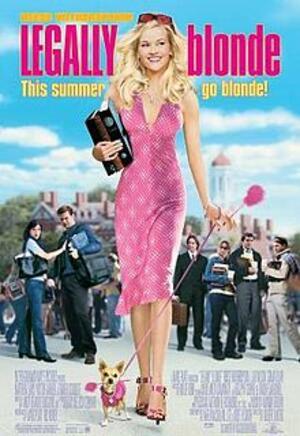Is Elle Woods a Feminist?
Elle Woods: lawyer extraordinaire, killer fashionista, and heroine of one of my favorite movies, Legally Blonde. The iconic 2001 film features the stereotypical “dumb blonde,” Elle Woods, who decides to attend Harvard Law School after her boyfriend, Warner, dumps her because he wants a more “serious” girlfriend. Elle Woods was one of my favorite heroines growing up, and I was not only in love with her sparkly outfits, but also with her fiery personality. It had been a couple years since I had watched the movie, but I caught myself thinking about Elle’s story as I walked around Harvard Square with my friend a few weeks ago. So, I decided to watch Legally Blonde again.
As I watched, I struggled with the movie’s concept for the first time—is Legally Blonde a feminist movie or not? I was able to pinpoint many scenes in which Elle’s inner feminist made me beam with pride. On the other hand, there were many moments that had me cringing.
One of the earliest plot points that disgusted me was the fact that Elle only applies to Harvard in order to win back her boyfriend. I was disheartened when she looked at a picture of a girl at Yale and exclaims, “This is the type of girl Warner wants to marry! This is what I need to become to be serious!” Oy, those two sentences really made me raise my eyebrows. Did society really need yet another movie about a woman whose breakup eclipses everything else in her life? At the beginning of the movie, Elle is a classic example of a “dumb blonde” who only cares about her boyfriend, and that is certainly not the most feminist way to kick things off.
Another not-so-feminist, and also subtler, aspect of the movie that I found disturbing was the rampant use of stereotypes. Elle’s sorority sisters at her California college are all portrayed as superficial, selfish, and spoiled. They are obsessed with expensive clothes, soap operas, and finding the perfect husbands. Conversely, the Harvard Law students are portrayed as cold, calculating, and blasé. The men are boring and nerdy, and the women are either “bitchy” or the lesbian stereotype. I found myself groaning at dialogue, images, and plot points revolving around these clichés throughout the whole movie. Seriously, what’s up with this? To be fair, the Harvard students evolve as more likable and realistic as the movie goes on, but the sorority sisters stay stupid and shallow.
Yet another plot point that frustrated me was the frequent girl vs. girl showdowns, especially those related to the feud between Elle and Vivian, Warner’s new girlfriend. Their relationship is full of plotting and scheming on Vivian’s part, and cringeworthy comebacks on Elle’s part, such as, “When I dress up as a frigid bitch I try not to look so constipated.” Women taking down other women is such a common trope in pop culture that its presence in Legally Blonde isn’t all that surprising.
Here’s the thing. For all the sexist content in this movie, its overall message happens to be super feminist. Although Elle’s initial motive for going to Harvard is questionable, the movie ends with her rejecting her ex and placing her law career over her past relationship. She stands up to Warner when he tells her she isn’t smart enough to get a law internship, and proves him wrong by excelling in all her courses and graduating at the top of her class. Like a strong feminist, Elle also hates when people don’t take her seriously, and judge her based on her looks. The scene in which she storms out of her professor’s office after he makes a pass at her is one of her best moments in the film. This inspiring quality of Elle’s was so important for young viewers to see, especially in the early 2000’s when movies like Mean Girls presented dangerously clichéd characterizations of teenaged boys and girls. Elle also mends her relationship with Vivian, and by the end of the movie there are numerous strong female friendships in the spotlight.
So, isn’t this the point of Legally Blonde—to show that stereotypes are damaging and that first impressions are misleading? I truly believe that this is what the filmmakers were going for. In some ways, they failed; in others, they succeeded. Legally Blonde presents a dynamic protagonist who disproves the “dumb blonde” stereotype by attending Harvard Law School and excelling as a law student. However, it still manages to perpetuate stereotypes and negative female tropes through more subtle plotlines and ensemble characters.
To be honest, Legally Blonde retains its place as one of my favorite childhood movies. I don’t think I’ll ever stop loving the cheesy jokes, epic outfits, and of course, Reese Witherspoon. However, after looking deeper, I found many anti-feminist layers that were alarming to uncover. My verdict, though? Elle Woods is a feminist. Legally Blonde has its share of problematic plot lines and characters, but Elle’s journey of determination and transformation makes her a feminist icon after all.
This piece was written as part of JWA’s Rising Voices Fellowship.







